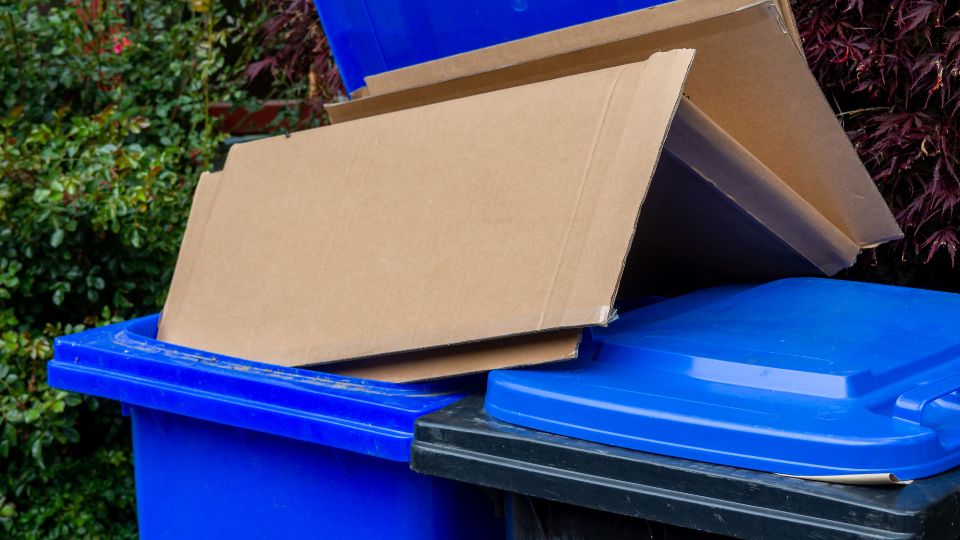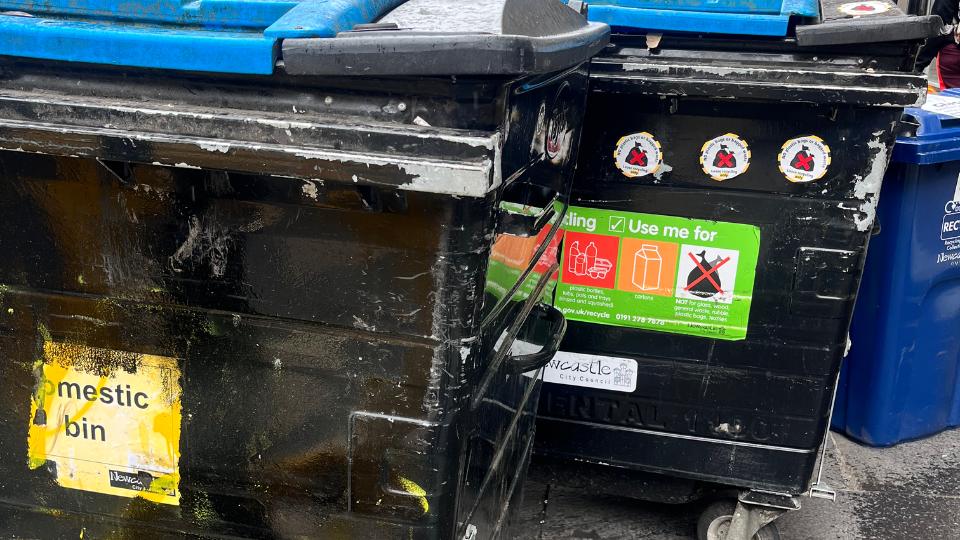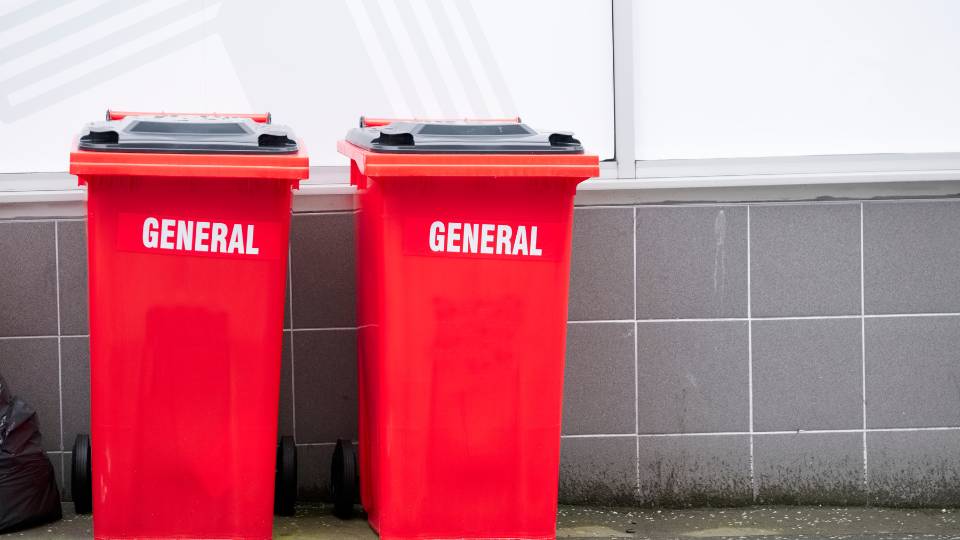
Quick Summary:
- Definition and Types: General waste includes non-recyclable materials such as certain plastics, soiled paper and textiles. Proper segregation helps to minimise landfill waste.
- Simpler Recycling Compliance: Under the new Simpler Recycling legislation, businesses must now separate recyclable materials (dry mixed recycling, glass and food waste) from general waste to avoid penalties.
- Best Practices: Businesses should conduct waste audits and implement reduction strategies in order to optimise disposal and ensure compliance with new regulations.
General waste bins are the most common types of waste bin for businesses.
Understanding and efficiently handling general waste is essential for businesses of all sizes.
Whether you run a small cafe or a large manufacturing plant, managing general waste effectively not only benefits the environment but also ensures compliance with UK regulations and contributes to cost savings.
In this guide, we’ll delve into everything you need to know about general waste, from its definition to regulations and disposal methods.
Table of Contents:
- What is General Waste?
- Why is Managing General Waste Important?
- General Waste Laws and Regulations in the UK
- How to Manage General Waste
- General Waste Facts and Statistics
- General Waste Disposal Methods
- Conclusion
What is General Waste?
General waste refers to non-recyclable waste that cannot be easily sorted and recycled.
It’s made up of various materials such as non-recyclable plastic, contaminated paper and cardboard, and other non-hazardous items that are typically disposed of in landfill sites or incinerators.
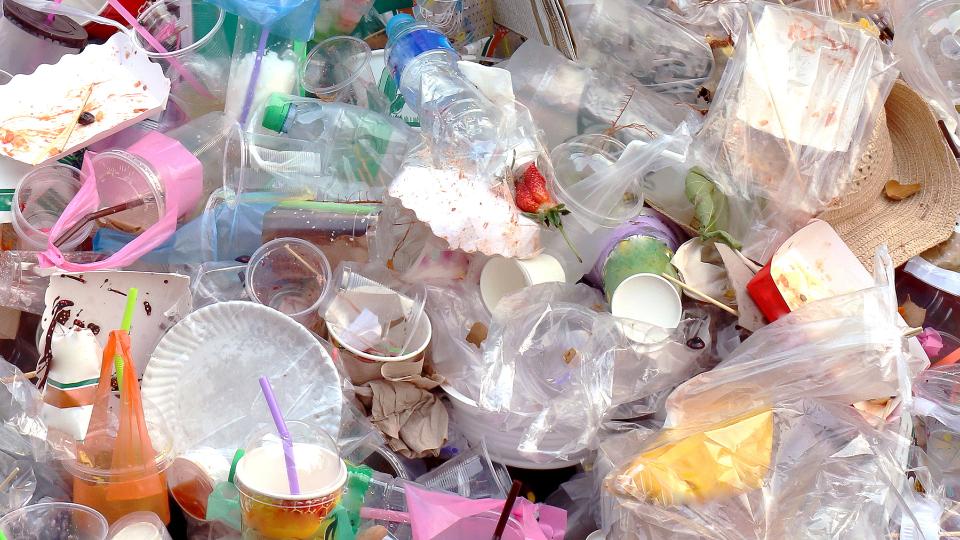
Common Examples of General Waste
- Non-recyclable plastics and packaging materials
- Soiled paper and cardboard
- Styrofoam and polystyrene
- Disposable diapers and sanitary products
- Small amounts of broken glass and ceramics
- Small quantities of non-hazardous chemicals
What can’t be put in a General Waste Bin?
- Recyclable materials
- Hazardous waste such as chemicals, batteries, and electronic waste
- Medical waste, including sharps and biohazardous materials
- Liquids and oils
- Paints and solvents
- Asbestos-containing materials
- Construction and demolition waste
Can you put cardboard in a general waste bin?
In most cases, soiled or contaminated cardboard should be placed in general waste bins – such as used pizza boxes.
However, it’s important to prioritise recycling whenever possible.
Clean and dry cardboard boxes can be recycled separately, reducing the volume of waste sent to landfill or incineration.
What kind of businesses need a general waste bin?
- Restaurants and cafes
- Retail stores and supermarkets
- Offices and commercial buildings
- Manufacturing facilities
- Hospitality establishments (hotels, resorts, etc.)
- Educational institutions
- Healthcare facilities
Characteristics of General Waste
- Complex Composition
General waste is heterogeneous, comprising a mixture of different materials with varying properties and degradation rates.
This complexity makes it challenging to sort and recycle effectively.
- Volume and Weight
Businesses and households generate significant quantities of general waste, leading to logistical challenges in storage, transportation, and disposal.
- Environmental Impact
Improper disposal of general waste can have adverse effects on the environment, including soil contamination, water pollution, and habitat destruction.
General waste represents a significant challenge for businesses and communities alike, requiring careful management to minimise its environmental impact and ensure compliance with regulations.
By understanding the composition, characteristics, and importance of general waste management, businesses can take proactive steps to reduce their environmental footprint and contribute to a more sustainable future.
What colour bin bags are general waste?
While colour coding may vary depending on local regulations and waste management policies, general waste is commonly disposed of in black or dark-coloured bags.
These bags help distinguish from other waste streams, such as food waste (which is usually put into clear biodegradable bags).
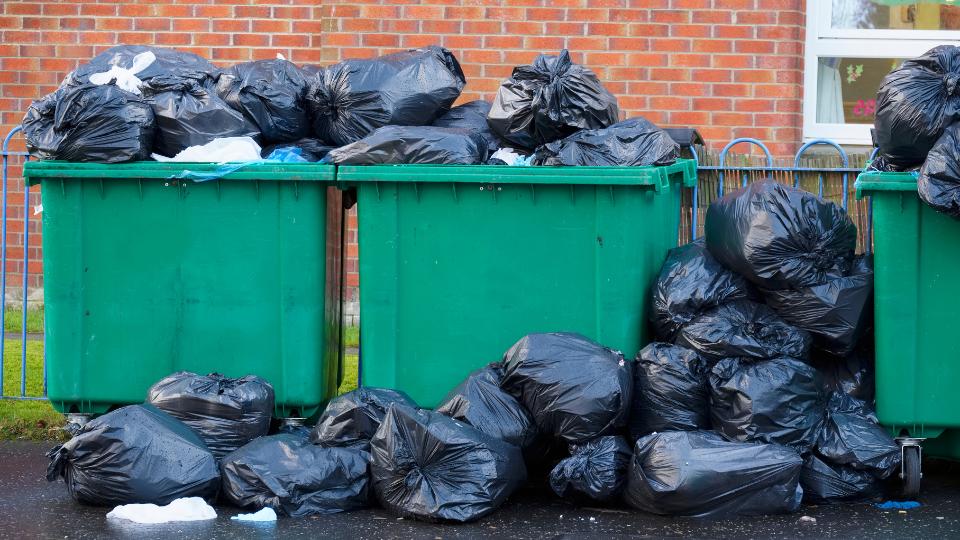
Why is Managing General Waste Important?
Managing general waste is important because it’s a huge part of responsible business operations with big consequences on the environment, your business’ compliance, and financial viability.
Let’s delve deeper into why businesses should prioritise the effective management of general waste:
Environmental Preservation
Proper management of general waste is essential for preserving natural resources, reducing pollution, and mitigating the impacts of climate change.
- Minimising Pollution
Improper disposal of general waste can lead to pollution of soil, water bodies, and the atmosphere.
Hazardous chemicals and toxins present in certain types of waste can leach into the environment, contaminating ecosystems and posing risks to human and animal health.
- Reducing Greenhouse Gas Emissions
Landfill sites, where much of the general waste ends up, emit methane and other greenhouse gases as organic materials decompose anaerobically.
These emissions contribute to climate change and global warming.
By minimising the amount of waste sent to landfills through recycling and waste-to-energy initiatives, businesses can help reduce their carbon footprint.
- Preserving Natural Resources
Many materials found in general waste, such as paper, plastics, and metals, are derived from finite natural resources.
By recycling these materials, businesses can conserve raw materials, reduce energy consumption associated with extraction and processing, and lessen the environmental impact of resource extraction activities.
Legal Compliance
Businesses are required to adhere to waste management regulations, which mandate proper handling, storage, and disposal of general waste to minimise environmental harm and public health risks.
- Regulatory Requirements
Businesses are subject to various waste management regulations and legislation, including the Environmental Protection Act 1990, the Waste (England and Wales) Regulations 2011 and the newly imposed Simpler Recycling legislation.
These regulations impose obligations on businesses to segregate, store, and dispose of their waste responsibly.
Failure to comply with these regulations can result in fines, penalties, and legal liabilities, damaging the reputation and financial stability of the business.
- Duty of Care
Under the Duty of Care regulations, businesses have a legal obligation to ensure that their waste is handled, stored, transported, and disposed of in a manner that does not harm the environment or human health.
This includes keeping accurate records of waste transfers and ensuring that waste is only transferred to authorised carriers and treatment facilities.
Did you know that soon you will have to use mandatory digital waste tracking software? Read more in our dedicated article.
Cost Efficiency
Implementing efficient waste management practices can lead to cost savings for businesses through reduced disposal fees, increased recycling revenue, and improved resource utilisation.
- Reduced Disposal Costs
Effective waste management practices, such as waste reduction, recycling, and composting, can help businesses minimise the amount of waste sent to landfill, thereby reducing disposal costs associated with landfill taxes and tipping fees.
- Revenue Generation
Recycling certain materials found in general waste, such as paper, cardboard, plastics, and metals, can generate revenue through the sale of recyclable materials to recycling facilities and processors.
Additionally, some businesses may be eligible for government incentives or grants for implementing recycling and waste reduction initiatives.
- Operational Efficiency
Implementing efficient waste management practices can streamline operations, improve resource utilisation, and reduce waste generation throughout the supply chain.
This can lead to cost savings, increased productivity, and enhanced competitiveness in the marketplace.
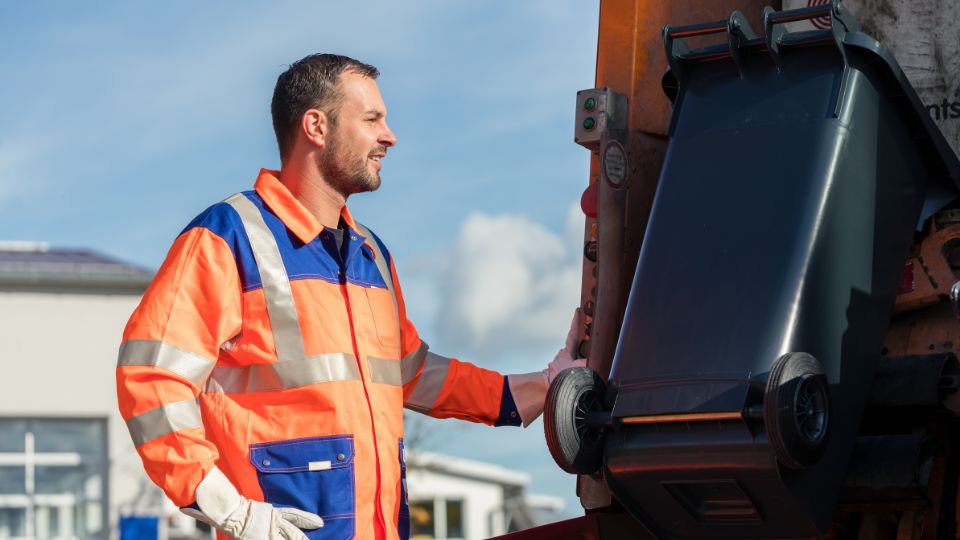
General Waste Laws and Regulations in the UK
In the United Kingdom, businesses are subject to a comprehensive framework of regulations and laws governing the management, disposal, and treatment of waste, including general waste.
Compliance with these regulations is essential for businesses to minimise environmental impact, protect public health, and avoid legal liabilities.
Let’s explore some of the key regulations relevant to commercial waste or business waste disposal:
Environmental Protection Act 1990
The Environmental Protection Act 1990 is one of the primary pieces of legislation governing waste management in the UK.
Key provisions of this Act relevant to general waste management include:
- Duty of Care
Businesses have a legal duty of care to ensure that their waste is stored, transported, treated, and disposed of safely and responsibly.
This duty extends from the point of waste generation to its final disposal and requires businesses to take all reasonable measures to prevent pollution and harm to human health and the environment.
- Waste Hierarchy
The Act promotes the waste hierarchy, which prioritises waste prevention, minimisation, reuse, recycling, recovery, and only as a last resort, disposal.
Businesses are encouraged to adopt measures to minimise waste generation and maximise resource recovery through recycling and other sustainable practices.
Waste (England and Wales) Regulations 2011
The Waste (England and Wales) Regulations 2011 build upon the framework established by the Environmental Protection Act 1990 and introduce additional requirements and obligations for waste management.
Key provisions of these regulations include:
- Waste Classification
The Regulations classify waste into various categories, including hazardous waste and non-hazardous waste, based on its properties and potential environmental and health risks.
Businesses must accurately classify their waste to ensure proper handling, storage, and disposal.
- Duty of Care Documentation
Businesses are required to maintain accurate records of their waste management activities, including waste transfers, consignee details, and waste disposal routes.
This documentation helps demonstrate compliance with the duty of care requirements and facilitates traceability and accountability throughout the waste management chain.
- Producer Responsibility Obligations
Certain businesses, particularly those involved in the production, import, or supply of goods and packaging, may have additional responsibilities under producer responsibility regulations.
These obligations may include registration, reporting, and financial contributions towards the recycling and recovery of packaging waste.
Landfill Tax
The Landfill Tax is an environmental tax imposed on the disposal of waste at landfill sites in the UK.
The tax aims to discourage waste disposal to landfills and incentivize waste reduction, recycling, and alternative waste treatment methods.
Key aspects of the Landfill Tax include:
- Tax Rates
The Landfill Tax is levied at different rates depending on the type of waste disposed of and the fiscal year.
Higher tax rates generally apply to hazardous waste and waste with higher environmental impact.
- Exemptions and Relief
Certain types of waste may be exempt from or eligible for relief from the Landfill Tax, such as inert waste, qualifying materials used for landfill restoration, and waste from charitable activities.
Businesses should familiarise themselves with the eligibility criteria for exemptions and relief to optimise their waste management strategies and minimise tax liabilities.
Simpler Recycling Legislation (2025)
The UK government’s Simpler Recycling initiative standardises waste collection across England, requiring businesses to separate recyclable materials from general waste.
The goal is to streamline recycling, reduce confusion, and improve sustainability.
- Mandatory Recycling Compliance:
From 31 March 2025, all businesses with 10 or more employees must separate dry mixed recycling, glass waste, and food waste from general waste.
Micro-businesses (fewer than 10 employees) have until 31 March 2027 to comply.
- Standardised Waste Streams:
Regardless of location, businesses will recycle the same materials, making it easier to manage waste and ensure compliance.
- Operational Impact & Benefits:
- Legal Requirement – Non-compliance may result in penalties.
- Cost Savings – Improved recycling efficiency could lower waste disposal costs.
- Sustainability Goals – Helps businesses meet ESG and net-zero targets.
Businesses should be reviewing waste management processes and ensuring staff are trained on the recycling rules.
We can help your business stay compliant – get a quote with us today.
Navigating the complex regulatory landscape surrounding general waste management can be challenging for businesses.
However, compliance with applicable regulations is essential to ensure environmental sustainability, legal compliance, and financial efficiency.
By staying informed about relevant laws and regulations, businesses can implement effective waste management practices, minimise environmental impact, and mitigate risks associated with non-compliance.
Additionally, seeking guidance from environmental consultants or waste management professionals can help businesses develop tailored solutions to meet their specific waste management needs while complying with regulatory requirements.
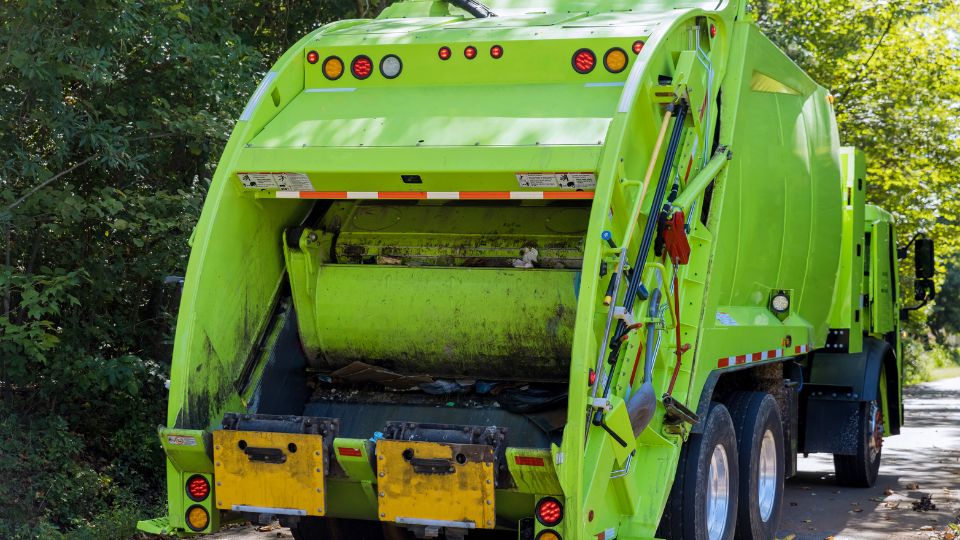
How to Manage General Waste
You can manage your general waste by doing regular waste audits, finding methods to reduce and prevent waste, segregating waste properly, and implementing better recycling initiatives.
Managing general waste effectively is essential for businesses to minimise environmental impact, comply with regulations, and achieve cost savings.
By implementing strategic waste management practices, businesses can reduce waste generation, increase recycling rates, and optimise disposal methods.
Here are some practical steps to help businesses manage general waste effectively:
Conduct a Waste Audit
Begin by conducting a comprehensive waste audit to assess the types and quantities of waste generated by your business.
Identify sources of waste generation, waste composition, and current waste management practices.
This information will serve as the foundation for developing an effective waste management strategy.
Waste Reduction and Prevention
Implement measures to minimise waste generation at the source.
This may include:
- Procurement Practices
Choose suppliers and products with minimal packaging or those packaged using recyclable materials.
- Product Design
Optimise product design to minimise waste during manufacturing, use, and disposal stages.
- Process Optimisation
Streamline production processes to reduce material wastage and improve resource efficiency.
Segregation and Storage
Set up designated waste collection areas and provide clearly labelled bins for different types of waste, including general waste, recyclables, and hazardous waste.
Educate employees about proper waste segregation practices to ensure that recyclable materials are separated from general waste effectively.
Recycling Initiatives
Implement recycling programs for materials commonly found in general waste, such as paper, cardboard, plastics, and metals.
Partner with local recycling facilities or waste management companies such as Waste Managed to arrange for the collection and recycling of recyclable materials.
Provide training and educational materials to employees to promote recycling awareness and participation.
Waste-to-Energy and Resource Recovery
Explore opportunities for waste-to-energy initiatives or resource recovery technologies to divert general waste from landfills and extract value from waste materials.
Consider technologies such as anaerobic digestion, composting, or incineration with energy recovery to convert organic waste into renewable energy or valuable by-products.
Educate and Train Employees
Provide training and awareness programs for employees to ensure they understand their roles and responsibilities in waste management.
Educate employees about the importance of waste reduction, segregation, and recycling, and encourage their active participation in waste management initiatives.
Continuous Improvement
Regularly review and evaluate your waste management practices to identify opportunities for improvement.
Monitor waste generation trends, recycling rates, and compliance with waste management procedures.
Solicit feedback from employees and stakeholders to identify areas for enhancement and implement corrective actions as needed.
Effective management of general waste requires a proactive and holistic approach that encompasses waste reduction, recycling, compliance with regulations, and ongoing improvement efforts.
By implementing the strategies outlined above, businesses can minimise their environmental footprint, achieve regulatory compliance, and realise cost savings through efficient waste management practices.
Investing in sustainable waste management not only benefits the environment but also enhances the reputation and competitiveness of businesses in today’s socially responsible marketplace.
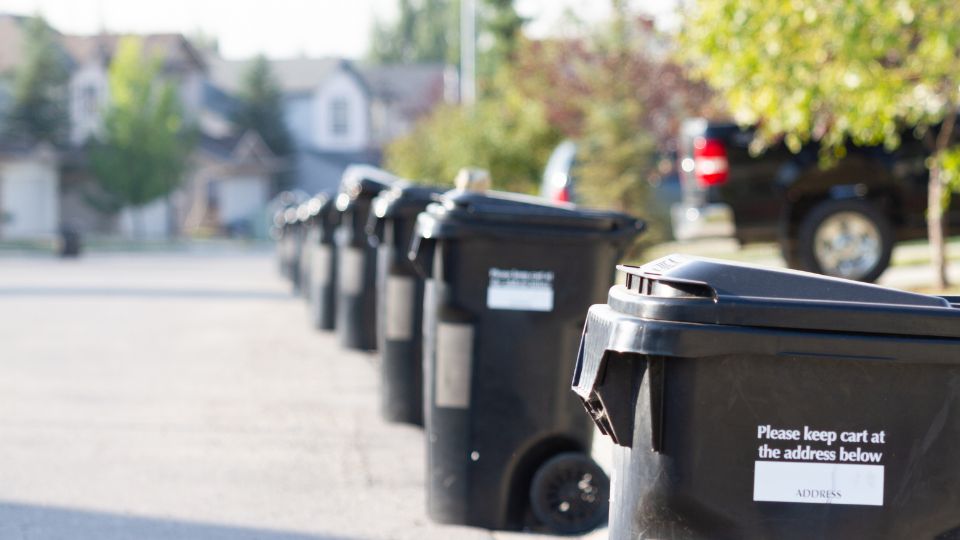
General Waste Facts and Statistics
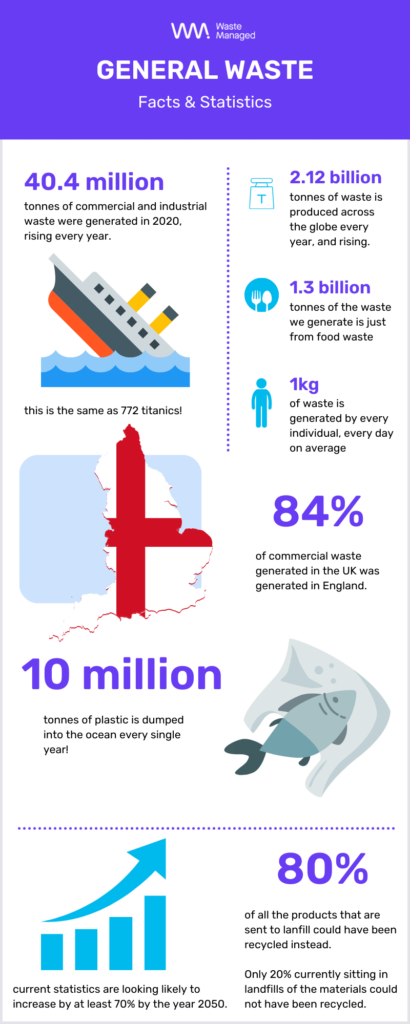
- UK businesses generated 40.4 million tonnes of commercial and industrial waste in 2020.
- 84% of the commercial waste generated in the UK was created in England.
- Current commercial waste statistics are likely to increase by 70% by 2050.
- 2.12 billion tonnes of waste is produced across the world each year, and rising.
- Food waste accounts for 1.3 billion tonnes of the waste we produce.
- The average person produces just under 1kg of waste every single day.
- It’s estimated that there are more than 10 million tonnes of plastic dumped into the oceans every single year.
- Around 80% of the materials sent to landfill could have been recycled instead.
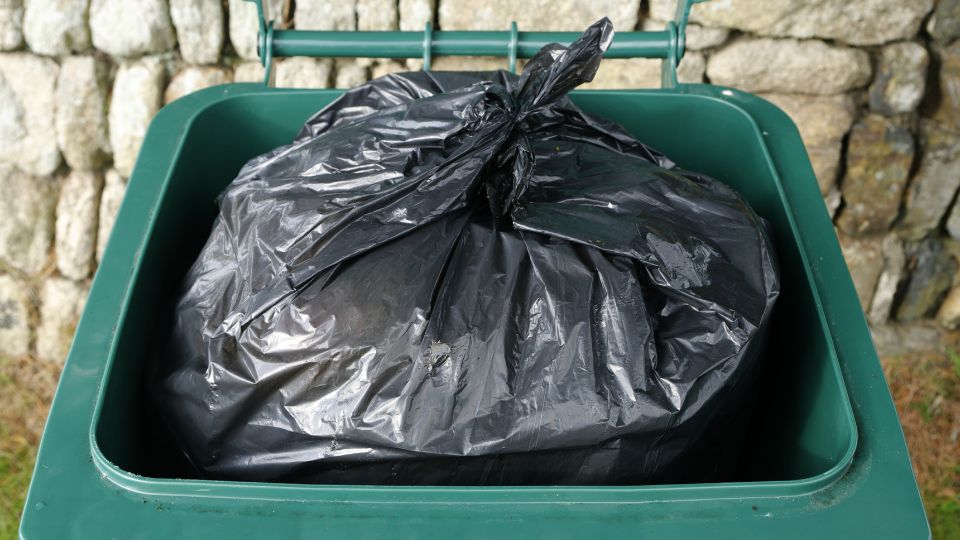
General Waste Disposal Methods
Disposing of general waste responsibly is essential to minimise environmental impact, comply with regulations, and ensure public health and safety.
While landfill disposal has historically been the most common method for handling general waste, there are now a variety of disposal options available, each with its own advantages and considerations. Let’s explore some of the primary general waste disposal methods:
Landfill Disposal
Landfill disposal involves burying waste in designated landfill sites, where it undergoes decomposition over time.
While landfilling remains a prevalent disposal method, it presents several environmental challenges, including:
- Environmental Pollution
Landfills can contribute to soil and groundwater contamination through leachate, a toxic liquid formed as waste decomposes.
- Greenhouse Gas Emissions
Landfills produce methane and carbon dioxide emissions, potent greenhouse gases that contribute to climate change.
Despite these drawbacks, landfilling may still be necessary for certain types of waste that cannot be recycled or recovered through alternative methods.
Incineration
Incineration, or waste-to-energy, involves burning general waste at high temperatures in specialised facilities called incinerators.
This process converts waste into ash, gases, and heat energy, which can be used for electricity generation or heating purposes.
Key considerations for incineration include:
- Energy Recovery
Incineration facilities can generate electricity or heat by capturing and utilizing the energy produced during combustion.
- Air Emissions Control
Modern incinerators are equipped with advanced pollution control technologies, such as scrubbers and filters, to minimise air emissions and ensure compliance with regulatory standards.
While incineration reduces the volume of waste sent to landfills and can generate energy, concerns remain about air pollution and the release of potentially harmful pollutants.
Waste-to-Energy (WtE) Technologies:
Waste-to-Energy technologies encompass a range of advanced processes that convert general waste into energy, fuels, or valuable by-products.
These technologies include:
- Anaerobic Digestion
Anaerobic digestion involves breaking down organic waste in the absence of oxygen to produce biogas, a renewable energy source, and nutrient-rich digestate for use as fertiliser.
- Gasification
Gasification converts solid waste into synthesis gas (syngas), which can be used for electricity generation, fuel production, or chemical synthesis.
- Pyrolysis
Pyrolysis uses high temperatures in the absence of oxygen to decompose organic waste into biochar, bio-oil, and syngas, which can be used as renewable fuels or feedstocks.
Waste-to-Energy technologies offer opportunities to reduce reliance on fossil fuels, minimise waste sent to landfills, and generate renewable energy or valuable products from waste materials.
Composting
Composting is a natural process that decomposes organic waste into nutrient-rich compost, which can be used to improve soil health and fertility.
Key benefits of composting include:
- Organic Waste Diversion
Composting diverts organic waste from landfills, where it would otherwise produce methane emissions.
- Soil Amendment
Compost can be used as a soil amendment in agriculture, landscaping, and horticulture to enhance soil structure, water retention, and nutrient content.
Composting is particularly well-suited for managing organic waste, such as food scraps, yard waste, and agricultural residues.
Can I put food waste into a general waste bin?
Food waste should be diverted from general waste bins and directed towards separate food waste bin.
In fact, if you’re a business located in Northern Ireland, Scotland, or Wales it’s now law that you must have a dedicated food waste bin if you throw away more than 5kg of food a week.
It is now law to have a dedicated food waste bin in England for businesses with more than 10 employees, regardless of how much food waste is produced.
By segregating food waste, businesses can contribute to the production of compost or biogas, reducing your environmental impact.
Choosing the right general waste disposal method depends on various factors, including the composition of the waste, environmental considerations, regulatory requirements, and resource availability.
While landfill disposal and incineration remain common methods, waste-to-energy technologies and composting offer sustainable alternatives for managing general waste.
By evaluating the benefits and challenges of each disposal method and implementing a comprehensive waste management strategy, businesses can minimise environmental impact, achieve regulatory compliance, and contribute to a more sustainable future.

Conclusion
Effective management of general waste is not only a legal obligation but also a moral responsibility for businesses in the UK.
By implementing sustainable waste management practices, businesses can minimise their environmental footprint, comply with regulations, and contribute to a cleaner, healthier future for generations to come.
Remember, every action taken towards proper general waste management makes a significant difference in preserving our planet for future generations.

